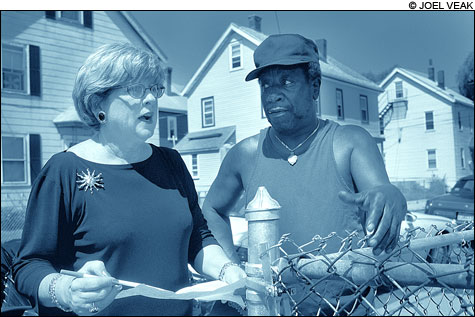While everyone was distracted by the New Hampshire primary, did City Council President Maureen Feeney step into the race for mayor?

GOING CITYWIDE: Feeney has a reputation for delivering services to her district. Does she seek a more prominent role?
|
This past week, with Bostonians’ attention focused on the presidential-primary drama north of the Massachusetts border, an opening salvo in the 2009 mayoral race may have been delivered. It came from an unlikely source: Maureen Feeney, city councilor from Dorchester.
Unanimously re-elected to the council presidency, Feeney used her acceptance speech on January 7 to take an unusually broad look at Boston’s priorities. Some in City Hall described it as a “State of the City” speech — and, as such, a challenge of sorts to Mayor Tom Menino’s annual assessment, delivered this past Tuesday.
Many in and around city politics anticipated that Menino would, as he often does, downplay the city’s troubles and cherry-pick positive data — such as a decline in the homicide rate — in his speech. Feeney made clear that such optimism would be inappropriate. “We need to make our neighborhoods safer,” she said. The status quo on schools, sustainable development, and property taxes is also unacceptable, she added.
Not just the content, but the tenor and wording of the speech left many thinking that Feeney is contemplating a mayoral campaign. She spoke at length, for instance, about her significance as a woman at the head of the Council — only the second in history — and her place among other women recently elected to high office in the state.
Phrases such as “leaving the torch that was passed to be kept aglow” sounded a little more like campaign rhetoric than typical chamber language for Feeney.
But most jarring, to some, was Feeney’s call for a “City Forum,” at which community leaders from all over Boston would discuss ways to promote greater civic engagement, a positively Deval-esque proposal that seemed to suggest a failing on the part of Menino.
And indeed, Menino immediately blasted the idea.
In doing so, the mayor took a harmless proposal that few would have noticed, and turned it into a potential symbol of his stubborn insularity. Menino objected that the gathering “would raise attendees’ expectations of city government, which might fail to deliver on them,” in the words of the Boston Globe.
As one councilor sarcastically told the Phoenix: “How dare she get citizens’ hopes up about the city?”
Another city councilor points out that, in light of the miserable turnout for this past November’s city election, the mayor should welcome any strategies for civic engagement. “With a 13 percent turnout, you’ve got to do something.”
One City Hall insider suggests that Menino has put himself into a bad position. Feeney seems likely to pull off the event, perhaps in April. The venue? To the surprise of many, consummate go-along-to-get-along Jim Rooney, head of the Massachusetts Convention Center Authority, has risked Menino’s wrath by offering free use of the new convention center, and sources say that philanthropists and nonprofit foundations stand ready to contribute any needed funding. “I don’t think we’re expecting the city to expend a lot of money,” says Justin Holmes, Feeney’s chief of staff.
That will leave Menino either petulantly standing outside, or joining the forum and endorsing Feeney’s idea, says the City Hall worker.
Feeney also called for a special committee to study ways to strengthen the notoriously weak Council’s powers — another idea sure to meet resistance from Menino.
And, in a little-noticed announcement, Feeney proposed to “expand the role of the Council’s post-audit and oversight committee.” That’s a little like congressional Democrats suddenly deciding to flex their presidential-oversight muscle after years of neglect.
The initial focus of that oversight, according to one councilor, will be the city’s finally providing money for items the Council fought to include in this past year’s budget — some of which remain unfunded halfway into the fiscal year, says the councilor.
Altogether, the speech struck observers as an attempt by Feeney to replace her reputation as a city-services deliverer for her district with a more prominent role as a city-wide player, and to shift from a close Menino ally to a voice of opposition.
Not everyone thinks that it necessarily means she’s planning a mayoral candidacy. “I don’t think she wants to be the next mayor,” says one councilor. “But it doesn’t hurt to raise your profile, and to make the most of an opportunity.”
Still, her speech has clearly pushed the 2009 mayoral chess game forward a few moves. It was no coincidence, observers agree, that the Boston Globe ran a story later that week about former district attorney Ralph Martin’s increasing maneuvers toward a possible mayoral run.
Together, can we?
The New Hampshire primary also distracted attention from a flurry of activity at the State House this past week, as Governor Deval Patrick and the state legislature sought to accomplish some high-priority goals — including a blockbuster energy bill — before the next state-budget showdown begins later this month.